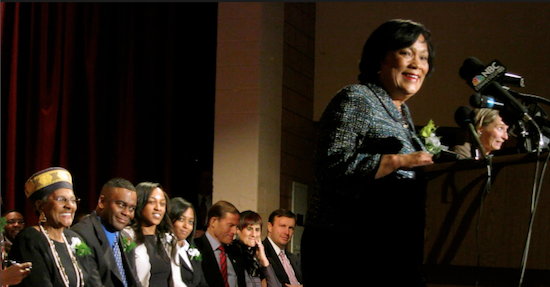
NEW HAVEN, CONN. — The auditorium and overflow room at New Haven’s Career High School were packed on Jan. 1 as Toni Harp was sworn in as the 50th mayor of New Haven, the City’s first woman and second African American mayor. Along with Harp, the Board of Alders and new city/town clerk Michael Smart were sworn in to office. The diversity and the remarks were inspiring with an invitation for all ideas to be considered toward job creation, improved public education and youth opportunities, and an end to violence in every neighborhood, for every resident.
Like the inauguration taking place at the same time in New York City, where Mayor Bill de Blasio took office vowing to take immediate steps toward ending inequality and injustice, the historic moment in New Haven was filled with possibilities.
Spirits were high in an atmosphere reflecting consistent, dedicated grass roots organizing over many years, resulting in a Board of Alders whose values come from their roots as clerical, service, health care and education workers. In 2011 history was made when voters elected union members and allies, many African American women, to two-thirds of the 30 Aldermanic seats.
In their first two years the Alders created a jobs pipeline, New Haven Works, undertook rebuilding a youth center, the Dixwell Community House, and re-instated community policing.
During the 2013 election campaign, opposition to Toni Harp pivoted on an anti-union message: the claim was made that she was beholden to the unions and not the people of the city. The same claim was made in opposition to those Alders who were supported by an alliance of union and community activists. They were dismissed by a small grouping called Take Back New Haven as a “union machine” and labeled equally as bad as the previous “Democratic Party machine.”
These claims were clearly meant to create confusion and division. “Union” and “machine” are two opposites. A “machine” is a few elite people making decisions behind closed doors. The “union” members and community allies went out into the neighborhoods with scores of volunteers knocking on doors day after day and bringing the message of the people back into the Board of Alders to create their agenda.
It has been said that New Haven is a company town where the company is Yale University. New Haven has deep poverty in the midst of Yale’s wealth. The population is majority African American and Latino.
Companies are expert at creating confusion and division in order to maintain their power and control. The workers at Yale, many of whom live in New Haven, have learned how to stand up for their rights and win gains through many strikes and contract battles. They have learned how to mobilize members, how to analyze proposals, how to develop strategy and tactics to win back more of the value they create for the University. In their recent contract they pushed for and won a mandate that the University hire 1,000 New Haven residents over four years.
That is why these New Haveners, these union workers, make New Haven stronger for everyone by serving on the Board of Alders. They bring their knowledge and experience and commitment to their neighborhoods, to the residents, and to the City as a whole. Along with union members from other workplaces serving on the Board, they are making steady progress. Much more is needed.
Whenever working and poor people gain some power, they know they will face many challenges from the boss, most often in the form of racism and other divisions to break the unity.
Even before their first meeting several Alders formed a new caucus to separate themselves from the “union machine.” This action weakens the chances of the mayor and the Board of Alders to come together and represent the needs of those neighborhoods that have been left behind. It is a huge diversion from the critical tasks at hand.
The Harp administration reflects many different forces in the city. The anti-union caucus undermines the labor community movement and its representatives on the Board of Alders as well as the mayor in their efforts to keep the needs of the people front and center.
Now is exactly the time to refuse to be divided by anti-union rhetoric or racism. Now is the time to stick together and celebrate the alliance of union and community. That is what will help Mayor Harp move the city forward to address inequalities and include every resident and neighborhood.
The significance of maintaining focus and unity from the grass roots goes far beyond New Haven. Progress in cities like New Haven, New York and others around the country can pave the way to elect a Congress that prioritizes ending inequality on a national scale.
Photo: Inauguration of New Haven Mayor Toni Harp, Jan. 1. 2014. New Haven Independent.












Comments